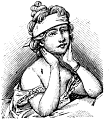From drink to think.
Dear Word Detective: My kids think the word “noggin” is hilarious. I have used it, in reference to their heads, and wondered about its history. Where, when and how did this word come into being? — Juliet.
Well, it was a dark and stormy night in the 1930s as Elwood Noggin, a retired stoat salesman in northern Nebraska, tinkered in his basement with his latest invention, an electric divining rod for locating lost car keys. As Noggin reached for the switch to test his invention, suddenly…. One moment please. I have just been informed that the foregoing story is not true. Oh well, that sort of fable almost never is. One might (as I sometimes do) view human history itself as being one long dark and stormy night, but few of our words have identifiable “moments of origin.” Like Topsy, they just sort of grow.
 But the results in cases such as “noggin” are nonetheless splendid. As slang for the human head (or any creature’s head, I suppose, although references to a cat’s noggin in classic literature seem rare), “noggin” is a wonderfully silly word. It’s difficult to imagine using “noggin” when genuine anger is involved, and “noggin” seems far more likely to crop up in an S.J. Perelman story or a Three Stooges episode than in a crime report.
But the results in cases such as “noggin” are nonetheless splendid. As slang for the human head (or any creature’s head, I suppose, although references to a cat’s noggin in classic literature seem rare), “noggin” is a wonderfully silly word. It’s difficult to imagine using “noggin” when genuine anger is involved, and “noggin” seems far more likely to crop up in an S.J. Perelman story or a Three Stooges episode than in a crime report.
Oddly enough, when “noggin” first appeared in English in the late 16th century, it had nothing to do, at least directly, with the human head. It mean “small cup or mug,” and by a hundred years later, had taken on the meaning of “a small drink of alcohol.” The roots of “noggin” are a mystery, but that second meaning of “small drink” may provide a clue. “Nog” at that time was a term used in England for a type of strong ale (or, by extension, any sort of alcoholic drink). It’s that “nog,” in fact, that underlies our modern “eggnog,” which combines (in its proper form) eggs, cream, sugar, nutmeg and rum. It’s possible that, since liquor affects primarily the head, that “noggin” was originally meant to refer to a head made woozy by drink. In any case, by the mid-18th century “noggin” had come into use as slang for the head, at first as a boxing term, but by the 19th century as a generalized slang term.
It is also possible that the transferred use of “noggin” from “cup” to “head” paralleled the evolution of “mug” in slang. In the 16th century, a “mug” was, as it is today, a heavy cup used for warm drinks. But in the 17th century it became common to decorate mugs with grotesque caricatures of human faces (such creations are still found in many curio and souvenir shops). By the early 18th century, “mug” had become popular slang for the actual human face, a sense we still use in “mugshot” (as well as in “to mug,” which originally referred to hitting a person in the face).




Leave a Reply